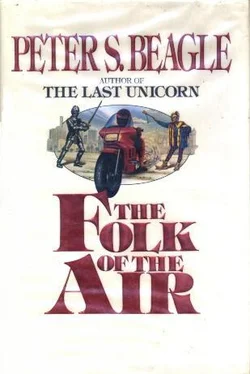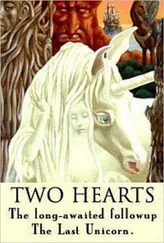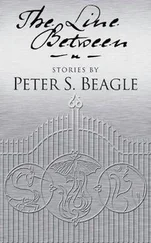Farrell thought of Sia in the living room and of the blind woman being lured from the tree under the stroking of her knife. He said, “This is the one you did your thesis on. I remember you wrote to me.”
“No, that was the Jarl himself. See, the Jarl of Hamar is already sort of half-legendary, even in 880.” Ben was patting Farrell’s shoulder unconsciously in little hard dabs of his bunched fingers, as he always did when he was explaining something. “He was one of Harold Fairhair’s first allies, him and the Jarl of Lade, and there’s just a lot known about him because he’s forever getting involved in politics—wars, plots, back-room deals, insurrections, the works. A really turbulent scoundrel, but people like him. The skalds keep writing new poems and songs about him.”
He grinned at Farrell’s look. “Joe, I can’t help it, I have to talk like that. He’s alive, that amazing no-good, this minute, living his crazy life, double-crossing and flimflamming for the pure pleasure of it, for the game, world without end. I wish to God I could write that thesis again. I thought he was dead, and it makes a difference.”
Farrell saw the marabou stork coming toward them, pacing softly, full of a carrion-eater’s mincing exaltation. The stained white down of its underbody was molting, and lichenous tufts clung to the great peeling beak— arms of lawn furniture, left outside all winter —and to the swollen pink pouch, veined and soft as a testicle. It had astonishingly sweet brown eyes, set in a tiny, naked, pimpled red head like an elbow.
Ben said, “But nobody writes songs or anything else about Egil. I’ve never read a word, there’s not a single reference, I had to find everything out from him . Egil’s not very glamorous, not theatrical; he’s just a farmer, starting to lose his hair, doesn’t give more of a damn that he can help about current events. He goes off raiding with the Jarl most years because it’s a change from harvesting rocks and trees and there’s more profit in it. Like most people. He knows a lot of poems by heart and everything about the weather and a whole lot of little games, like children’s games, with stones and string.”
“And he can’t swim,” Farrell whispered, remembering Ben’s instants of sudden dreadful terror in the pool. Ben nodded. “That’s right, he can’t swim a lick—still tends to get seasick, as a matter of fact. He’s good with horses, though, and he’s a born fighter, a natural, better than the Jarl himself.” He gave a harsh chuckle, startling the stork. It thrust out its ghastly head and made a sound like sizzling grease.
“How do you know he’s losing his hair?” Farrell asked. The warm wind had shifted slightly, upsetting the smaller birds, who began to blow around their enclosures in clumsy, stuttering gusts. Ben said, “I can see it sometimes. In the mirror.”
He was almost chattering as they walked on. “Actually, Egil’s had a wild life himself, in his own grumbly farmer way. Did I tell you that he was a slave in Morocco for three years? Married there, had a child, got away when a bunch of Danes came raiding. And he was at Hafrsfjord, and some berserker type put a spear right through him—touched the stomach and went out under the shoulder blade, judging by the scar. He saw a sea serpent once, a kraken, off the Faroes. It had a goat’s head, and it stank like a dead whale.”
“What happened to his family in Morocco? Did he ever find them again?” But Ben did not hear him. He was rubbing his throat, tugging hard at the skin. “Joe, you don’t know, you can’t imagine. The smells, the darkness under the trees. They sing a lot, people sound right on the edge of singing all the time. The weather, my God, you hear birds bumping down the roof all night long, frozen dead. I don’t think they have weather like that anymore, anywhere, or darkness.”
A child running by kicked Farrell’s ankle and anointed him with something greenish and wettish. Stopping to wipe his pants leg, he asked, trying to keep his voice gruffly neutral, “What happens? How do you call him, reach him, whatever it is you do? Can you control it?” Ben did not answer or look at him. Farrell let it go until they had nearly reached the Cape hunting dogs’ yard; then he burst out, “You don’t control him. He comes by himself, am I right? I’m right. Seizures. More like late-period Dr. Jekyll, that’s what it’s goddamn like.” He had not realized how angry he was, nor how profoundly shaken, until he heard his own voice.
Ben turned to face him at last, arms wrapped around his body as if against some dismembering cold beyond even Egil Eyvindsson’s understanding. Nicholas would know. Nicholas Bonner knows about cold .
“It’s not that simple.” Farrell could barely hear him, but the dogs broke their endless trotting round and ran close to stare, blotchy tongues dripping out of bat faces. Ben said, “He can’t control it, either. He doesn’t come because he wants to come.”
“A civil liberties issue,” Farrell said. His ribs were beginning to feel badly bruised, and his head ached. He said, “Tell me what happens.”
The answer was quiet and clear, curiously formal. “I love him, Joe. What happens between us is an exchange, like love. He’s alive in his world, exactly as I am in mine. We found a way to trade times, for ten seconds, five minutes, half a day, two days. It’s just gotten a bit out of hand, that’s all. Like love.”
A keeper whom Farrell liked passed by, calling to him what the vet had decided about the rhinoceros’s arthritic hind leg. Ben laughed suddenly, the shuddering whine of a saw seized up in damp wood. “Or maybe it’s like the Groucho Marx line, how he’s got Bright’s disease and Bright’s got his.” He seemed to want to touch Farrell, but could not let go of himself for more than a moment. “Joe, nobody knows anything about being a ninth-century Viking, nobody but me. I mean, how could they? They know the damn verse forms, they know dates, kings, funeral rituals, all the people the Danes or the Jutes beat up on. But there is nobody else, nobody in the world , who can tell you a Viking joke. Just me, do you realize that? You want to hear one now?”
“If it’s about the two Swedes, I’ve already heard it,” Farrell said wearily. “I want you to tell me where you go, how you get there, what it feels like when you’re there.” He glanced at his watch and added, “And I think you should do it fairly quickly, because I have to go drive my little green train.” Even my armpits hurt. I am too old for this, too old for everything .
Ben said, “Bright’s disease.” He laughed again, in the old way this time, struggling not to. “Joe, I don’t know what to tell you. I’m swarming with memories that aren’t mine. Those peanuts you gave me, I ate them here, but I tasted them in another time. Somebody tasted them.” Farrell actually felt his jaw drop, which was a new experience. “Things taste so different there, Joe; the light’s all different, the constellations, the facial expressions—even whistling sounds different, for God’s sake. Feelings. People don’t dream the way we do, nothing like us, nothing.” His voice was level enough, but his teeth were chattering. He said, “I have his dreams sometimes. I can’t wake up from those by myself. If Sia weren’t there, I’d never wake up. Nobody would know.”
“Is anybody there for Egil? When he dreams you?” Ben blinked and frowned as if he had not heard the question. Farrell said, “Technique, that’s what I want. Procedure. Do you say Shazam , do you drink something really vile, do you just stand still by yourself and think about Egil in a special way? Tell me, Ben.”
The Cape dogs danced hotly against the bars, whining with grim urgency. They smelled to Farrell of blood and horse dung and chocolate, and he wondered whether they could sense Egil, if only as a wrongness, a constant disquieting shiver in their wild logic. Ben stared back at them silently. Farrell saw his supervisor tacking shyly toward them by way of trash-can inspections. “The League. Is that the way it started, being Egil in the League? Is that the connection?”
Читать дальше












